外研版(2019) 必修第一册 Unit 4 Friends Forever Understanding ideas 课件(32张ppt)
文档属性
| 名称 | 外研版(2019) 必修第一册 Unit 4 Friends Forever Understanding ideas 课件(32张ppt) | 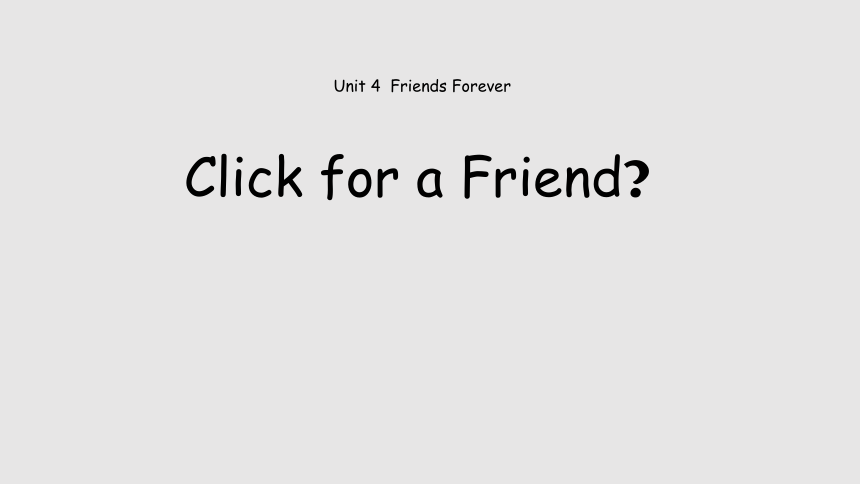 | |
| 格式 | pptx | ||
| 文件大小 | 25.1MB | ||
| 资源类型 | 教案 | ||
| 版本资源 | 外研版(2019) | ||
| 科目 | 英语 | ||
| 更新时间 | 2022-09-27 17:45:57 | ||
图片预览

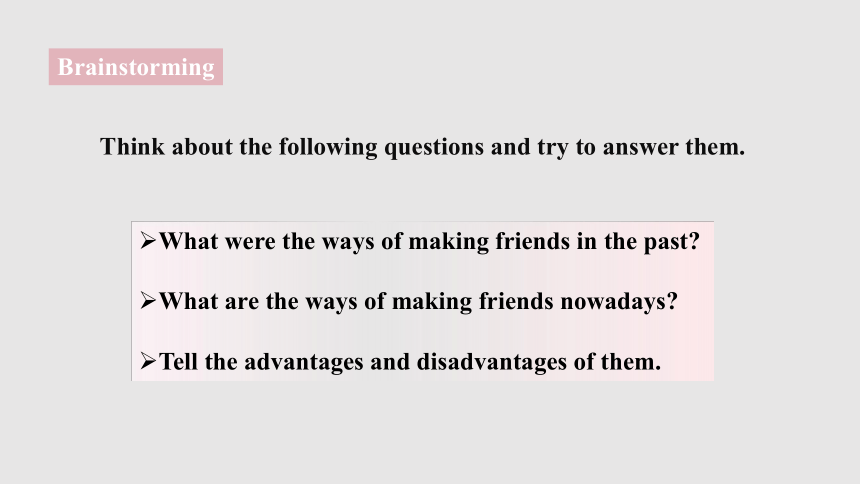
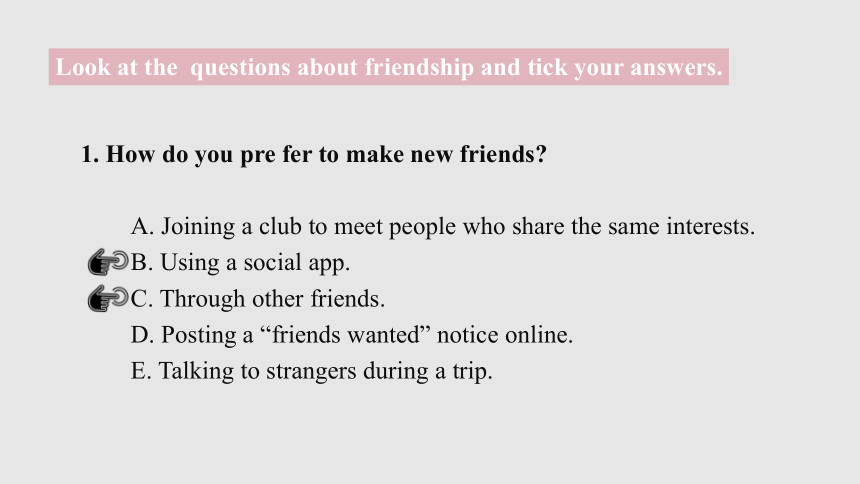
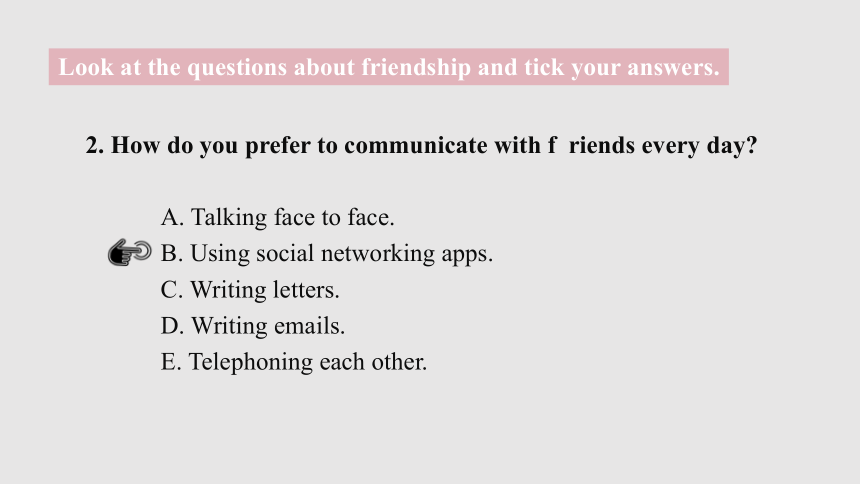
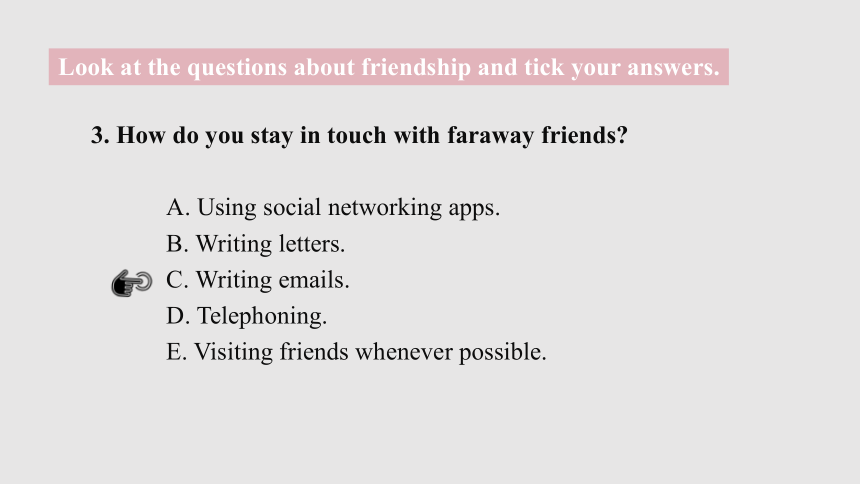

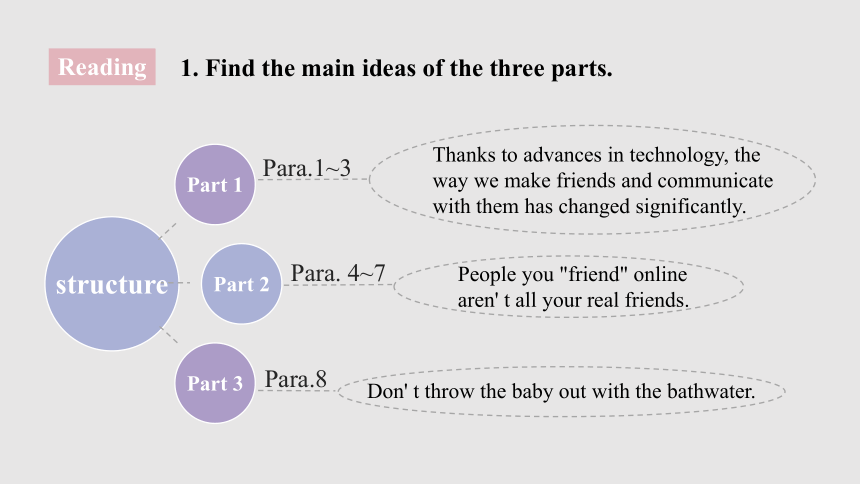
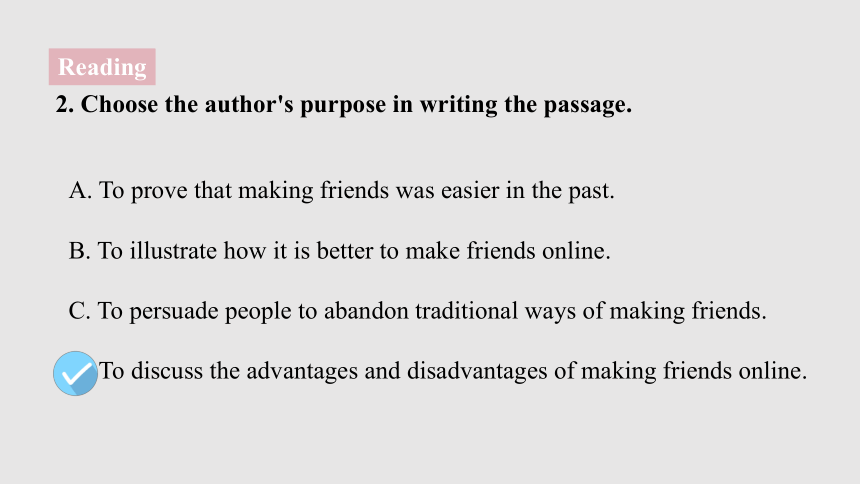
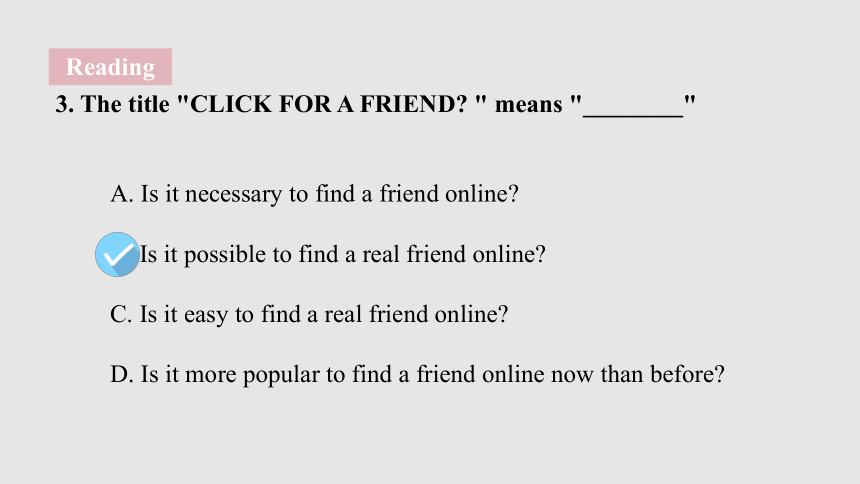
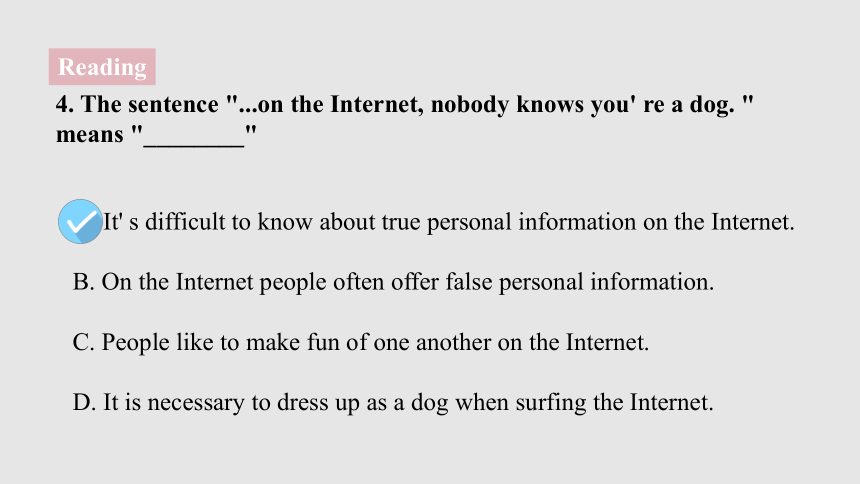
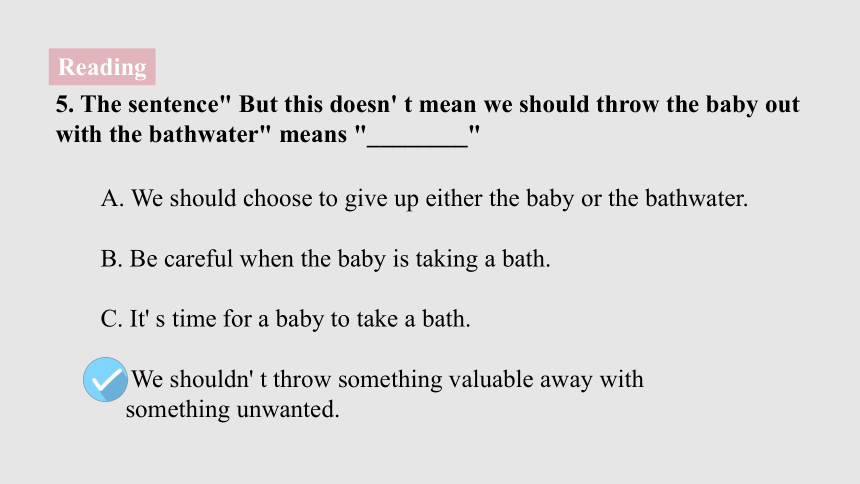
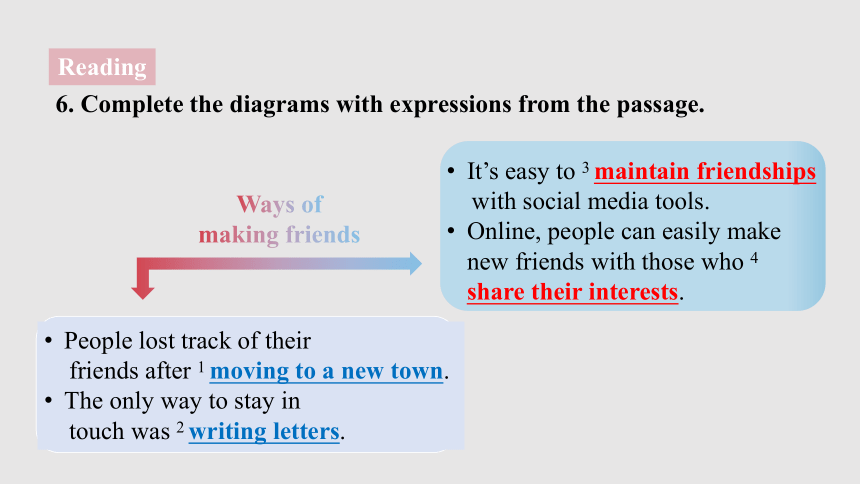
文档简介
(共31张PPT)
Unit 4 Friends Forever
Click for a Friend?
What were the ways of making friends in the past
What are the ways of making friends nowadays
Tell the advantages and disadvantages of them.
Brainstorming
Think about the following questions and try to answer them.
1. How do you pre fer to make new friends
A. Joining a club to meet people who share the same interests.
B. Using a social app.
C. Through other friends.
D. Posting a “friends wanted” notice online.
E. Talking to strangers during a trip.
Look at the questions about friendship and tick your answers.
2. How do you prefer to communicate with f riends every day
A. Talking face to face.
B. Using social networking apps.
C. Writing letters.
D. Writing emails.
E. Telephoning each other.
Look at the questions about friendship and tick your answers.
3. How do you stay in touch with faraway friends
A. Using social networking apps.
B. Writing letters.
C. Writing emails.
D. Telephoning.
E. Visiting friends whenever possible.
Look at the questions about friendship and tick your answers.
Reading
Para.1~3
Para. 4~7
Para.8
Reading
Thanks to advances in technology, the way we make friends and communicate with them has changed significantly.
People you "friend" online aren' t all your real friends.
Don' t throw the baby out with the bathwater.
Part 1
Part 2
Part 3
structure
1. Find the main ideas of the three parts.
Reading
2. Choose the author's purpose in writing the passage.
A. To prove that making friends was easier in the past.
B. To illustrate how it is better to make friends online.
C. To persuade people to abandon traditional ways of making friends.
D. To discuss the advantages and disadvantages of making friends online.
Reading
3. The title "CLICK FOR A FRIEND " means "________"
A. Is it necessary to find a friend online
B. Is it possible to find a real friend online
C. Is it easy to find a real friend online
D. Is it more popular to find a friend online now than before
Reading
4. The sentence "...on the Internet, nobody knows you' re a dog. " means "________"
A. It' s difficult to know about true personal information on the Internet.
B. On the Internet people often offer false personal information.
C. People like to make fun of one another on the Internet.
D. It is necessary to dress up as a dog when surfing the Internet.
Reading
5. The sentence" But this doesn' t mean we should throw the baby out with the bathwater" means "________"
A. We should choose to give up either the baby or the bathwater.
B. Be careful when the baby is taking a bath.
C. It' s time for a baby to take a bath.
D. We shouldn' t throw something valuable away with
something unwanted.
Reading
6. Complete the diagrams with expressions from the passage.
People lost track of their
friends after 1 moving to a new town.
The only way to stay in
touch was 2 writing letters.
It’s easy to 3 maintain friendships
with social media tools.
Online, people can easily make new friends with those who 4 share their interests.
Ways of
making friends
Reading
6. Complete the diagrams with expressions from the passage.
It can be real if people 5 exchange true personal information online.
It might not be real because social media doesn’t present 6 the whole truth about a person, and people tend to
7 post only positive updates.
Online friendship:
real or not?
Language Points
familiar adj.熟悉的
sb be familiar with...
...be familiar to sb
某人熟悉…
…为某人所熟悉
familiar adj.熟悉的
1. Are you familiar with the computer software they use
2. Mo Yan' s novels are familiar to a large number of readers.
prefer vt.更喜欢;选择某事物(而不选择其他事物)
prefer (sb) to do sth
prefer (doing) sth to (doing) sth
prefer to do sth rather than do sth
=would rather do sth than do sth
更喜欢(某人)做某事
宁愿(做)某事…也不愿(做)某事
宁可做某事也不愿做某事
prefer vt.更喜欢;选择某事物(而不选择其他事物)
1. I would prefer reading books written by Mo Yan to watching TV
series based on his novels.
2. He prefers to die rather than give in to the enemy.
deliver vt.递送,传送;接生;发表(演说等)
deliver...to...
deliver a speech
把…传送给…
发表演讲/致辞
deliver vt.递送,传送;接生;发表(演说等)
1. He delivered a speech at the opening ceremony of the World Cup.
2. The doctor delivered the twins safely last night.
3. Did you deliver my message to my mother
advance n.进步,进展 v.前进;促进;提出;提前 adj.预先的,在前的
in advance
in advance of...
事先,事前
在…前面;比…进步/超前
advance n.进步,进展 v.前进;促进;提出;提前 adj.预先的,在前的
1. There have been great advances in medicine in the last ten years.
2. You' d better make a plan in advance.
3. He is far in advance of his class.
tend v.趋向于;往往会发生某事;照看
tend to do sth.
tend (to) sb.
tend to/ towards
易于,往往会做某事
照顾某人
倾向于,趋于
tend v.易于做某事,往往会发生某事;照看
1. The English seasons and climate tend to/towards extremes.
2. Mom was usually busy tending to my younger sisters.
3. Boys and girls tend to be different in this regard.
tend v.趋向于;往往会发生某事;照看
lose track of 失去联系
keep track of/with = be out of contact with
be on track
track down
与…保持联系,了解…的动态
稳步前进,做法对头
追踪找到,追查到
stay/ keep in touch with 与…保持联系(强调状态)
be in touch with... 和…有联系
be out of touch with... 和…失去联系
get in touch with... 和…取得联系
lose touch with... 和…失去联系
强调状态
强调动作
keep/ bear... in mind 记住
come to mind
bring...to mind
make up one' s mind
change one' s mind
突然想起
使想起…
下定决心
改变主意
其他相关结构
1. What...for 为什么?
2. What about/ How about... …怎么样?(表示建议)
3. How come 用于口语交际中,表示疑惑,意为“为什么会这样呢,怎么搞的 ”How come 还可以接从句或doing 形式。
4. So what 那又怎么样?
其他相关结构
1. What...for 为什么?
2. What about/ How about... …怎么样?(表示建议)
4. So what 那又怎么样?
其他相关结构
4. How come 用于口语交际中,表示疑惑,意为“为什么会这样呢,怎么搞的 ”How come 还可以接从句或doing 形式。
If she spent five years in Paris, how come her French is so bad
既然她在巴黎待了五年,
她的法语怎么还会这样糟糕?
As long as one has a true friend,
he is close even when far away.
Unit 4 Friends Forever
Click for a Friend?
What were the ways of making friends in the past
What are the ways of making friends nowadays
Tell the advantages and disadvantages of them.
Brainstorming
Think about the following questions and try to answer them.
1. How do you pre fer to make new friends
A. Joining a club to meet people who share the same interests.
B. Using a social app.
C. Through other friends.
D. Posting a “friends wanted” notice online.
E. Talking to strangers during a trip.
Look at the questions about friendship and tick your answers.
2. How do you prefer to communicate with f riends every day
A. Talking face to face.
B. Using social networking apps.
C. Writing letters.
D. Writing emails.
E. Telephoning each other.
Look at the questions about friendship and tick your answers.
3. How do you stay in touch with faraway friends
A. Using social networking apps.
B. Writing letters.
C. Writing emails.
D. Telephoning.
E. Visiting friends whenever possible.
Look at the questions about friendship and tick your answers.
Reading
Para.1~3
Para. 4~7
Para.8
Reading
Thanks to advances in technology, the way we make friends and communicate with them has changed significantly.
People you "friend" online aren' t all your real friends.
Don' t throw the baby out with the bathwater.
Part 1
Part 2
Part 3
structure
1. Find the main ideas of the three parts.
Reading
2. Choose the author's purpose in writing the passage.
A. To prove that making friends was easier in the past.
B. To illustrate how it is better to make friends online.
C. To persuade people to abandon traditional ways of making friends.
D. To discuss the advantages and disadvantages of making friends online.
Reading
3. The title "CLICK FOR A FRIEND " means "________"
A. Is it necessary to find a friend online
B. Is it possible to find a real friend online
C. Is it easy to find a real friend online
D. Is it more popular to find a friend online now than before
Reading
4. The sentence "...on the Internet, nobody knows you' re a dog. " means "________"
A. It' s difficult to know about true personal information on the Internet.
B. On the Internet people often offer false personal information.
C. People like to make fun of one another on the Internet.
D. It is necessary to dress up as a dog when surfing the Internet.
Reading
5. The sentence" But this doesn' t mean we should throw the baby out with the bathwater" means "________"
A. We should choose to give up either the baby or the bathwater.
B. Be careful when the baby is taking a bath.
C. It' s time for a baby to take a bath.
D. We shouldn' t throw something valuable away with
something unwanted.
Reading
6. Complete the diagrams with expressions from the passage.
People lost track of their
friends after 1 moving to a new town.
The only way to stay in
touch was 2 writing letters.
It’s easy to 3 maintain friendships
with social media tools.
Online, people can easily make new friends with those who 4 share their interests.
Ways of
making friends
Reading
6. Complete the diagrams with expressions from the passage.
It can be real if people 5 exchange true personal information online.
It might not be real because social media doesn’t present 6 the whole truth about a person, and people tend to
7 post only positive updates.
Online friendship:
real or not?
Language Points
familiar adj.熟悉的
sb be familiar with...
...be familiar to sb
某人熟悉…
…为某人所熟悉
familiar adj.熟悉的
1. Are you familiar with the computer software they use
2. Mo Yan' s novels are familiar to a large number of readers.
prefer vt.更喜欢;选择某事物(而不选择其他事物)
prefer (sb) to do sth
prefer (doing) sth to (doing) sth
prefer to do sth rather than do sth
=would rather do sth than do sth
更喜欢(某人)做某事
宁愿(做)某事…也不愿(做)某事
宁可做某事也不愿做某事
prefer vt.更喜欢;选择某事物(而不选择其他事物)
1. I would prefer reading books written by Mo Yan to watching TV
series based on his novels.
2. He prefers to die rather than give in to the enemy.
deliver vt.递送,传送;接生;发表(演说等)
deliver...to...
deliver a speech
把…传送给…
发表演讲/致辞
deliver vt.递送,传送;接生;发表(演说等)
1. He delivered a speech at the opening ceremony of the World Cup.
2. The doctor delivered the twins safely last night.
3. Did you deliver my message to my mother
advance n.进步,进展 v.前进;促进;提出;提前 adj.预先的,在前的
in advance
in advance of...
事先,事前
在…前面;比…进步/超前
advance n.进步,进展 v.前进;促进;提出;提前 adj.预先的,在前的
1. There have been great advances in medicine in the last ten years.
2. You' d better make a plan in advance.
3. He is far in advance of his class.
tend v.趋向于;往往会发生某事;照看
tend to do sth.
tend (to) sb.
tend to/ towards
易于,往往会做某事
照顾某人
倾向于,趋于
tend v.易于做某事,往往会发生某事;照看
1. The English seasons and climate tend to/towards extremes.
2. Mom was usually busy tending to my younger sisters.
3. Boys and girls tend to be different in this regard.
tend v.趋向于;往往会发生某事;照看
lose track of 失去联系
keep track of/with = be out of contact with
be on track
track down
与…保持联系,了解…的动态
稳步前进,做法对头
追踪找到,追查到
stay/ keep in touch with 与…保持联系(强调状态)
be in touch with... 和…有联系
be out of touch with... 和…失去联系
get in touch with... 和…取得联系
lose touch with... 和…失去联系
强调状态
强调动作
keep/ bear... in mind 记住
come to mind
bring...to mind
make up one' s mind
change one' s mind
突然想起
使想起…
下定决心
改变主意
其他相关结构
1. What...for 为什么?
2. What about/ How about... …怎么样?(表示建议)
3. How come 用于口语交际中,表示疑惑,意为“为什么会这样呢,怎么搞的 ”How come 还可以接从句或doing 形式。
4. So what 那又怎么样?
其他相关结构
1. What...for 为什么?
2. What about/ How about... …怎么样?(表示建议)
4. So what 那又怎么样?
其他相关结构
4. How come 用于口语交际中,表示疑惑,意为“为什么会这样呢,怎么搞的 ”How come 还可以接从句或doing 形式。
If she spent five years in Paris, how come her French is so bad
既然她在巴黎待了五年,
她的法语怎么还会这样糟糕?
As long as one has a true friend,
he is close even when far away.
